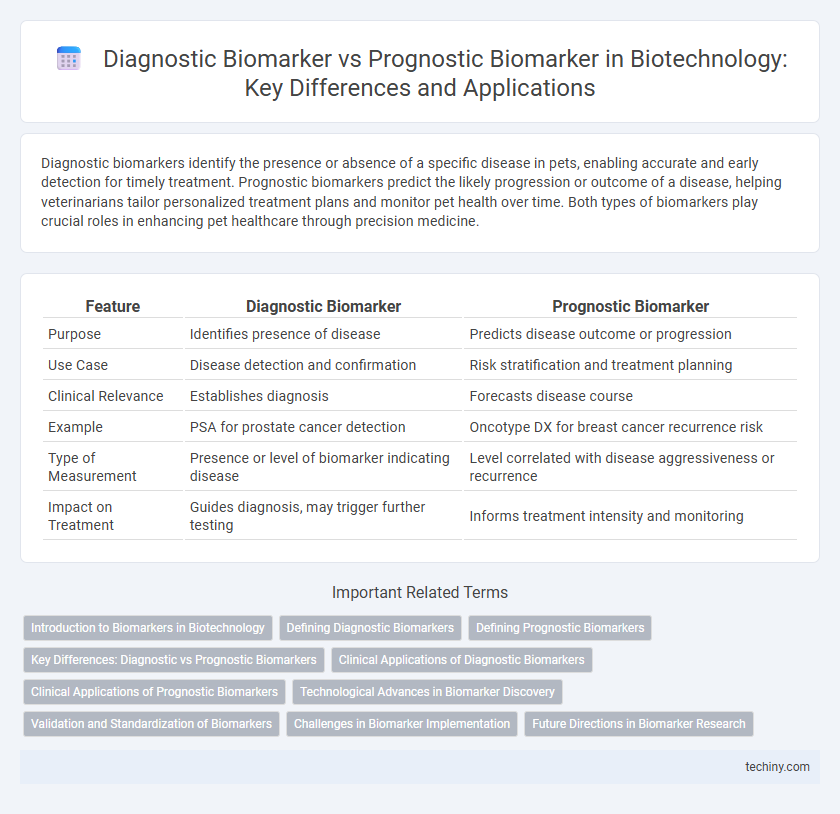Diagnostic biomarkers identify the presence or absence of a specific disease in pets, enabling accurate and early detection for timely treatment. Prognostic biomarkers predict the likely progression or outcome of a disease, helping veterinarians tailor personalized treatment plans and monitor pet health over time. Both types of biomarkers play crucial roles in enhancing pet healthcare through precision medicine.
Table of Comparison
| Feature | Diagnostic Biomarker | Prognostic Biomarker |
|---|---|---|
| Purpose | Identifies presence of disease | Predicts disease outcome or progression |
| Use Case | Disease detection and confirmation | Risk stratification and treatment planning |
| Clinical Relevance | Establishes diagnosis | Forecasts disease course |
| Example | PSA for prostate cancer detection | Oncotype DX for breast cancer recurrence risk |
| Type of Measurement | Presence or level of biomarker indicating disease | Level correlated with disease aggressiveness or recurrence |
| Impact on Treatment | Guides diagnosis, may trigger further testing | Informs treatment intensity and monitoring |
Introduction to Biomarkers in Biotechnology
Diagnostic biomarkers identify the presence or absence of a disease, enabling early detection and accurate diagnosis in clinical settings. Prognostic biomarkers provide information on the likely disease progression, helping to predict patient outcomes and guide treatment decisions. Both types of biomarkers are essential in biotechnology for personalized medicine, improving disease management through targeted therapeutic strategies.
Defining Diagnostic Biomarkers
Diagnostic biomarkers are biological molecules or indicators used to detect or confirm the presence of a specific disease or condition by distinguishing affected individuals from healthy ones. These biomarkers, including proteins, genes, or metabolites, provide critical information for early disease detection, enabling precise and timely clinical decision-making. Unlike prognostic biomarkers that predict disease outcome, diagnostic biomarkers focus solely on identifying current pathological status.
Defining Prognostic Biomarkers
Prognostic biomarkers provide critical information about the likely course or outcome of a disease independent of treatment, enabling risk stratification and personalized patient management. These biomarkers are essential in oncology for predicting disease progression, recurrence, and overall survival, guiding clinical decisions and therapeutic strategies. Unlike diagnostic biomarkers, which identify the presence of disease, prognostic biomarkers inform prognosis and help tailor long-term treatment plans.
Key Differences: Diagnostic vs Prognostic Biomarkers
Diagnostic biomarkers identify the presence or absence of a specific disease by detecting molecular signatures unique to pathological conditions, enabling early and accurate disease detection. Prognostic biomarkers predict the likely course or outcome of a disease by assessing factors such as disease progression, recurrence risk, or patient survival probabilities. Unlike diagnostic biomarkers, which confirm disease status, prognostic biomarkers provide critical information for personalized treatment strategies and long-term patient management.
Clinical Applications of Diagnostic Biomarkers
Diagnostic biomarkers are critical in clinical settings for detecting specific diseases or conditions with high sensitivity and specificity, enabling early and accurate diagnosis. They guide treatment decisions by confirming the presence or absence of a disease, such as identifying cancer through specific protein levels or genetic mutations. Diagnostic biomarkers improve patient outcomes by facilitating timely intervention and monitoring disease progression or response to therapy.
Clinical Applications of Prognostic Biomarkers
Prognostic biomarkers provide critical insights into disease progression, enabling clinicians to predict patient outcomes and tailor treatment strategies effectively. These biomarkers are pivotal in cancer management, where they inform the likelihood of recurrence and survival independent of therapy. Integrating prognostic biomarkers into clinical practice enhances personalized medicine by guiding decisions on monitoring intensity and therapeutic interventions.
Technological Advances in Biomarker Discovery
Technological advances in biomarker discovery, such as high-throughput sequencing and mass spectrometry, have revolutionized the identification of diagnostic biomarkers that enable early and accurate disease detection. Prognostic biomarkers benefit from integrated multi-omics approaches and machine learning algorithms, facilitating precise predictions of disease progression and treatment response. These innovations accelerate personalized medicine by enabling tailored therapeutic strategies based on robust biomarker profiles.
Validation and Standardization of Biomarkers
Validation of diagnostic biomarkers involves rigorous clinical trials to ensure accuracy and reproducibility in detecting specific diseases or conditions. In contrast, prognostic biomarkers require longitudinal studies to standardize their predictive power regarding disease progression and patient outcomes. Standardization protocols for both biomarker types emphasize assay consistency, sensitivity, and specificity to enable reliable comparisons across laboratories and clinical settings.
Challenges in Biomarker Implementation
Challenges in biomarker implementation include variability in diagnostic biomarker sensitivity and specificity, which affects accurate disease identification, while prognostic biomarkers often face difficulties in predicting disease progression due to heterogeneous patient responses. Standardizing assay methods and integrating multi-omics data remain critical hurdles for both biomarker types. Regulatory approval processes and the need for large-scale validation studies further complicate transitioning biomarkers from research to clinical practice.
Future Directions in Biomarker Research
Future directions in biomarker research emphasize integrating multi-omics data to enhance the specificity and sensitivity of diagnostic biomarkers for early disease detection. Advances in machine learning algorithms facilitate the development of prognostic biomarkers that predict disease progression and patient outcomes with greater accuracy. Emerging approaches focus on personalized medicine, leveraging biomarker profiles to tailor therapeutic interventions and improve clinical decision-making.
diagnostic biomarker vs prognostic biomarker Infographic

 techiny.com
techiny.com